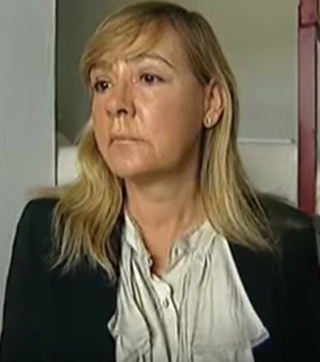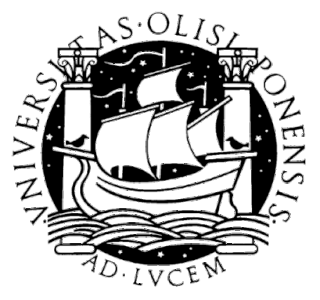Related Research Articles

The University of Lisbon is a public research university in Lisbon, and the largest university in Portugal. It was originally founded in 1911, but the present structure of the university dates from the 2013 merger of the former University of Lisbon (1911–2013) and the Technical University of Lisbon (1930–2013).

Francisco Manuel Trigoso de Aragão Morato, best known as Francisco Trigoso was a Portuguese liberalist politician. He presided over the Portuguese government from 1 August to 6 December 1826.
Anselmo Fernandez Rodrigues was a Portuguese architect and football manager who led Sporting Clube de Portugal to victory in the UEFA Cup Winners' Cup in 1964.

The Catholic University of Portugal, also referred to as Católica or UCP for short, is a concordat university headquartered in Lisbon and with four locations: Lisbon, Braga, Porto and Viseu. Besides the four centres in Portugal, UCP also has the University of Saint Joseph in Macau as its affiliate.

Rui Miguel Marcelino Tavares Pereira, commonly known simply as Rui Tavares, is a Portuguese historian and politician. He has been elected a Member of the Assembly of the Republic in the 2022 legislative election, and has been a member of the Lisbon City Council since 2021.

Paula Maria von Hafe Teixeira da Cruz is a Portuguese lawyer and politician. She served as Minister of Justice in the government led by Pedro Passos Coelho from 2011 to 2015.

Armando Manuel de Barros Serra Marques Guedes is a political scientist, anthropologist and a former diplomat with expertise in international relations, political science, theory and philosophy, diplomacy, security and defence, and geopolitics. He is a professor of political science, law, and international politics at the Universidade Nova de Lisboa, as well as the professor responsible for geopolitics at the Instituto Universitário Militar, Instituto de Estudos Superiores Militares.

The University of Lisbon was a public university in Lisbon, Portugal. It was founded in 1911 after the fall of the Portuguese monarchy and was later integrated in the new University of Lisbon along with the former Technical University of Lisbon.
Maria João Espírito Santo Bustorff SilvaGOM is a Portuguese restoration specialist, philanthropist and former politician. She is known for her historical and cultural restoration and preservation work in both Portugal and Brazil through the Ricardo Espírito Santo Foundation, and also for being Minister of Culture during the government of Prime Minister Pedro Santana Lopes.
Paulo Pinto de Albuquerque is a Portuguese judge born in Beira, Mozambique and was the judge of the European Court of Human Rights in respect of Portugal from April 2011 to March 2020.

Elvira Maria Correia Fortunato is a Portuguese scientist and minister of science and technology. She is a professor in the Department of Materials Science at the NOVA School of Science and Technology and vice-rector of the NOVA University Lisbon. Fortunato is an innovator in the field of paper electronics, including transistors, memories, sensors, batteries, displays, antennas, and solar cells.
Ruth Garcês (1934–2006) was a Portuguese lawyer, magistrate and judge. She was the first female magistrate and the first female judge in Portugal. She founded the Portuguese Association of Women Judges.

Isabel de Magalhães Colaço was a Portuguese lawyer and university professor who was the first woman to obtain a doctorate of law in Portugal and the first woman to sit on the country’s Constitutional Court.

Paula Escarameia was a Portuguese jurist. She was the first woman to be elected by the United Nations General Assembly to the International Law Commission (ILC).

The House of the Twenty-Four was a corporation in the pre-Constitutional Kingdom of Portugal that functioned as a deliberative assembly of craftsmen, with significant political power in local government.
Regina Tavares da Silva is a Portuguese politician, feminist, historical researcher and an international expert on women's rights. She has chaired several women's organizations, both Portuguese and international. She is arguably best known for her insistence that women's equality should not be treated as a social issue but as a requirement of both democracy and human rights.

Isabel Moreira is a Portuguese jurist and politician of the Socialist Party (PS) who has been serving as a member of the Assembly of the Republic since 2011. She is known for her campaigns in favour of LGBT rights.
Maria Lúcia Amaral is a Portuguese lawyer, university professor, politician and judge. She was vice-president of the Constitutional Court of Portugal and is Portugal's 10th Ombudsman, being the first woman to hold this post.
Cláudia Cruz Santos is a Portuguese academic and politician. As a member of the Portuguese Socialist Party (PS), she has been a deputy in the Portuguese Assembly of the Republic since 2019.

Catarina Sarmento e Castro is a Portuguese jurist and politician. As a member of the Portuguese Socialist Party (PS), she became a deputy in the Portuguese Assembly of the Republic in the January 2022 Portuguese legislative election, representing the Leiria District. Between 2019 and 2022 she served as Secretary of State for Human Resources and Former Combatants. A professor in the Faculty of Law at the University of Coimbra, she has also served as a judge in the Constitutional Court. She was appointed Minister of Justice in March 2022, following the 2022 Portuguese legislative election, when the PS won an overall majority.
References
- 1 2 3 4 Lisboa, Faculdade de Direito | Universidade de. "Ana Maria Guerra Martins | Faculdade de Direito | Universidade de Lisboa" . Retrieved 2021-01-03.
- 1 2 "PACE - Doc. 14954 (2019) - Election of Judges to the European Court of Human Rights List and curricula vitae of candidates submitted by the Government of Portugal". assembly.coe.int. Retrieved 2021-01-03.
- 1 2 3 "Composition of the European Court of Human Rights". European Court of Human Rights . Retrieved 2 January 2021.
- 1 2 3 Portugal, Rádio e Televisão de (2 October 2019). "Ana Maria Guerra Martins é a nova juíza portuguesa no Tribunal Europeu dos Direitos do Homem". Ana Maria Guerra Martins é a nova juíza portuguesa no Tribunal Europeu dos Direitos do Homem (in Portuguese). Retrieved 2021-01-03.